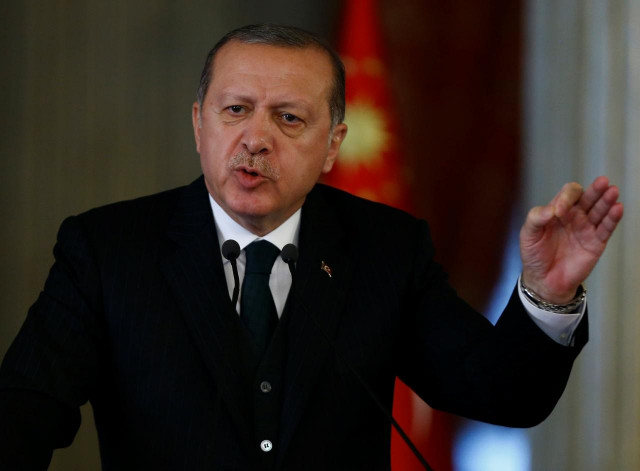Former allies of Turkey's Erdogan plan rival party after Istanbul defeat
With economic recession, unemployment, inflation hurting voters and eating into ruling party support base

A file photo of Turkish President Recep Tayyip Erdogan. PHOTO: REUTERS
Behind the breakaway plans are former deputy prime minister Ali Babacan and former president Abdullah Gul, both founding members of Erdogan’s AK Party (AKP), according to two political advisers.
Sunday’s re-run mayoral election delivered the second loss in recent months for the AK Party (AKP) in Turkey’s largest city, a bitter setback for the president who has ruled for 16 years. It has also emboldened critics within his own party who have for years hinted at plans to form a rival party because of dissatisfaction over Erdogan’s increasing powers over the party and government.
With economic recession, unemployment and inflation hurting Turkish voters and eating into the AKP’s support base, any further erosion - even just a few percentage points of voter support – could be deeply damaging for the party, which already relies on an alliance with nationalists for its parliamentary majority.
“Babacan and Gul will most likely form the party in the fall,” said one of the advisers, who is close to Babacan.
The new party’s policies would mirror the early years of the AKP, the adviser added.
When the AKP was launched in 2001, it blended an religious outlook with a pro-Western, democratic and liberate market approach which enjoyed broad popular backing.
The two men have been considering establishing the party for around six months, but the process has been given momentum by the AKP’s loss of Turkey’s main cities in the March 31 municipal elections, said the other adviser, who is familiar with the plans for the new party.
He did not say how the party would be funded but said the preparation so far had included meetings with current AKP parliamentarians, other politicians and academics.
The politicians haven’t publicly commented on the plans, but Gul broke ranks with the AKP last month to signal his discontent at the decision to annul the initial opposition victory in Istanbul after a series of appeals from Erdogan’s party.
In a tweet, he compared the decision to re-run the election to a 2007 constitutional court ruling raising the number of parliamentarians required to approve a new president - which was viewed as an attempt to obstruct his path to the presidency.
Babacan served as economy and foreign minister in the first years of AKP government before becoming deputy prime minister, a role he held from 2009 to 2015. Gul was president from 2007 until 2014, when then-prime minister Erdogan moved to the presidency.
An AKP official, who asked not to be named, said the party was aware of the plan to launch a rival group.
“Babacan is a strong and respected figure. Of course, the AK Party will be affected by the new party, but we are able to lose some AK Party supporters like some other parties,” the official said.
He added that the party must accept responsibility for the election results. “We need to return to a policy where we can govern the state, but still be with the people.”
‘AKP MONOPOLY’
There are many precedents for new parties in Turkey, including two years ago when disgruntled members of the nationalist MHP party broke away to form the Iyi (Good) Party. It won 10% of the vote in last year’s parliamentary election.
The adviser close to Babacan said there was support from AKP members of parliament for the breakaway group, without specifying how many.
He added that he expected “a few surprising important supporters,” but didn’t provide names.
If a new party is established, it could lead to more resignations and defections from the AKP, breaking its hold over a large swathe of pious and conservative voters, said Galip Dalay, a visiting scholar at Oxford University.
“The AKP’s monopoly over the conservative sector of society will be broken,” he said.
One prominent AKP figure, former prime minister Ahmet Davutoglu, has been openly critical of the party, slamming government economic policies, media restrictions and the damage he said had been inflicted on Turkish institutions.
A source close to Davutoglu said he was planning a ‘new step,’ but provided no details beyond saying the politician did not plan to join Gul and Babacan for now.



















COMMENTS
Comments are moderated and generally will be posted if they are on-topic and not abusive.
For more information, please see our Comments FAQ